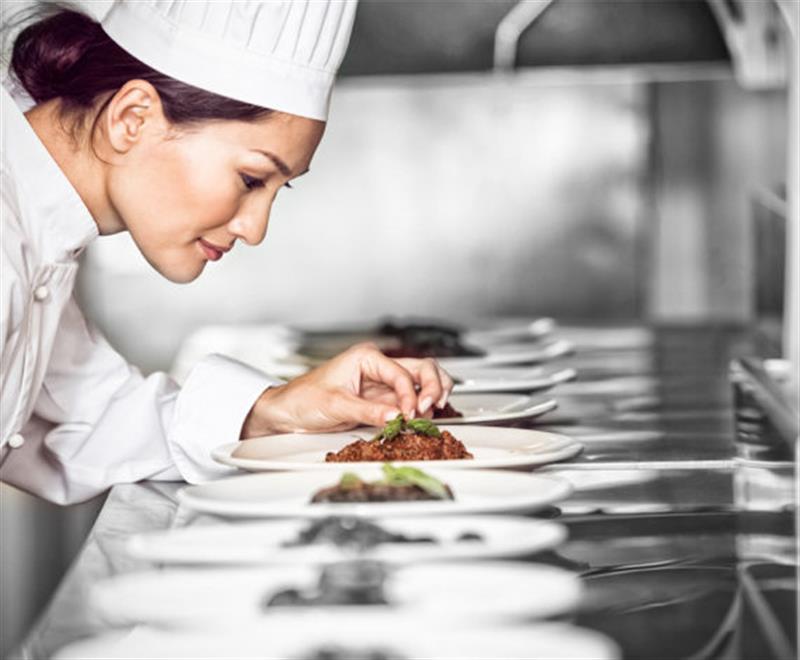
Chefs are in high demand all over the world. They oversee food production at places where food is served. They may work in restaurants, private homes, events, and hotels. Chefs are responsible for directing the cooking staff and for making numerous decisions related to everything from food production to administrative issues.
It takes a variety of both hard and soft skills to be a great chef who can effectively command a kitchen. If you’re passionate about creating new recipes, are detail-oriented, and want to lead a successful kitchen, then becoming a chef could be the perfect fit for you.
What Kind of Skills Do You Need to Be a Chef?
Attention to Detail
Cooking is a science. Every ingredient and measurement must be exact including ordering food products or figuring out how long to cook certain items so that they’re all plated at the same time. A chef needs to have an eye for details such as:
- Heat Control
- Measuring
- Portion Sizing
- Precision
- Presentation
- Quality of Food
- Supervising
Business Sense
A good chef should also be good at running a business. He or she should always be thinking about how to make delicious food while also being cost-effective. Chefs often deal with the following tasks:
- Administrative
- Budgeting
- Business Acumen
- Business Sense
- Computer Skills
- Conceptual Thinking
- Control Labor Costs
- Cost Control
- Cost Reduction
- Customer Service
- Food Pricing
- Food Safety
- Food Regulations
- Food Science
- Food Service Management
- Hiring
- Inventory Management
- Inventory Rotation
- Kitchen Management
- Local Foods
- Ordering
- Operations
- Product Selection
Cleanliness
Chefs need to know how to keep their kitchen sanitary. This is very important in a restaurant, where unsanitary conditions can affect the quality of the food, and can even force a restaurant to shut down. Chefs are responsible for following the local health code and dealing with:
- Health and Safety
- Hygiene
- Sanitary Practices
Creativity
Working in the food industry requires creativity. Chefs must be open to incorporating new food items into menus as well as improving older recipes. Creativity and imagination will keep customers coming back for more. Chefs experiment in the following ways:
- Collaboration
- Experimenting
- Menu Design
- Presentation
- Recipe Design
- Trial and Error
Culinary Expertise
The most important hard skill chefs need is an ability to cook, as well as knowledge of the kitchen. This broad skill includes a variety of smaller skills, including knife and tasting skills. Chefs need to be able to cook precisely and efficiently. They also need to be skilled at recognizing flavors and judging the balance of seasonings. Chefs often have experience with:
- Baking
- Baking Techniques
- Consistency
- Cooking
- Culinary Expertise
- Food Preparation
- Grilling
- Ingredient Selection
- Knife Control
- Knife Cuts
- Knife Skills
- Pastry
- Presentation
Fast-Paced Decision Making
A chef should be able to make decisions quickly and efficiently. The kitchen is a fast-paced environment, and a chef has to make numerous decisions at once. They should be able to:
- Handle Pressure
- Problem Solving
- Take Initiative
Motivational Management Style
A good chef will motivate those working in the kitchen. He or she should be able to keep everyone working at a fast, efficient pace by demonstrating the following traits:
- Communication
- Cooking Techniques
- Leadership
- Passion
Organization
Chefs must be very organized in the kitchen. Often, they have to work on a variety of tasks at once and must do so while keeping the kitchen clean and safe. They must create order and structure in the kitchen. They do this in the following ways:
- Commitment to Quality
- Being Efficient
- Kitchen Safety
- Kitchen Tools
- Multitasking
- Planning
- Safe Food Handling
- Sanitary Practices
Team Player
A chef is part of a team and must be able to work well with others. Not only must he or she work with the other cooks in the kitchen, but he or she must also be able to work effectively with staff and management. Chefs should be able to:
Accept Feedback- Collaborate
- Show Compassion
- Emotional Intelligence
- Give Feedback
- Be Interpersonal
- Have a Sense of Humor
- Team Building
- Training
More Chef Skills
- Banquet Dining
- Catering
- First Aid
- Flexibility
- Handle Criticism
- Hotel Kitchen
- Nutrition
- Portion Control
- Seasoning
- Service
- Source Ingredients
- Supervision
- Well-Tuned Palate
- Willingness to Learn